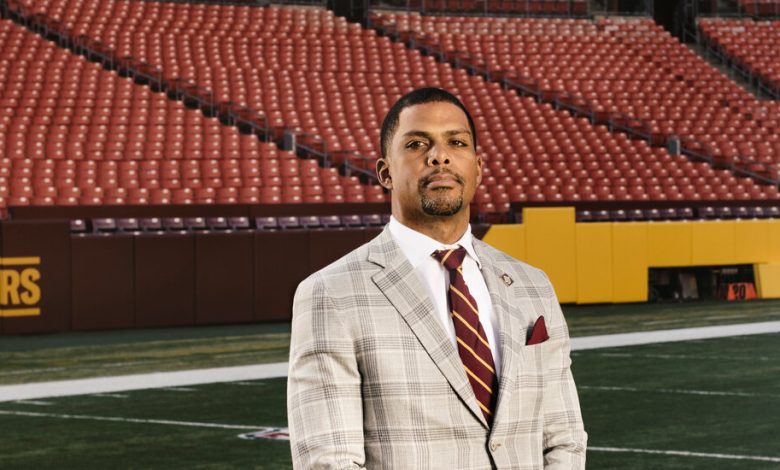A Milestone for Black N.F.L. Hires, but Not on the Sidelines

LANDOVER, Md. — Jason Wright, the Washington Commanders president, underestimated how public-facing the role would be when Daniel and Tanya Snyder, the team’s embattled owners, hired him in 2020.
The couple lured Wright, a former N.F.L. running back, from the consulting firm McKinsey & Company to spearhead new business ventures, but most importantly to create a new culture.
“If I could custom design a leader for this important time in our history, it would be Jason,” Daniel Snyder said in a statement at the time of Wright’s hiring. “His experience as a former player, coupled with his business acumen, gives him a perspective that is unrivaled in the league.”
The spotlight shined on Wright particularly brighter during the first days of his tenure, when he appeared on national morning newscasts that highlighted his becoming the first Black president of an N.F.L. team. He initially wanted to de-emphasize the achievement, he said, before he began to embrace it as a way to hopefully empower his peers and employees.
“It was something that I tried to downplay because I felt like it was a little bit of it was sort of parading out the token,” Wright said in an interview in November.
He quickly gained company.
In the span of about two and a half years, four other Black team presidents — Kevin Warren (Chicago Bears), Sashi Brown (Baltimore Ravens), Sandra Douglass Morgan (Las Vegas Raiders) and Damani Leech (Denver Broncos) — were hired. The surge means that more than 15 percent of the league’s presidents are Black.
The rapid influx of senior Black executives is a watershed moment for a league long criticized for its mostly white, mostly male leadership. It also counters the fierce debate over how to diversify football’s sidelines, where there are just four Black head coaches (six nonwhite men, total) of the league’s 32 teams despite decades of hand-wringing over how to shake up hiring. The Arizona Cardinals and Indianapolis Colts are in the process of selecting head coaches.
Some N.F.L. officials said they were hopeful that the hiring of five Black presidents could provide a model for expanding the makeup of the league’s decision makers, though others noted the roadblocks to applying the model to coaching searches. And, in interviews with the new hires and diversity observers, many noted that the challenges the Black executives face mirror the struggles of Black leaders in corporate America: juggling the optimism of their new jobs while figuring out how to solve the chaotic circumstances left by others.
Inside a luxury suite in November at FedEx Field, the Commanders’ home stadium, Wright described his job’s expansiveness while glancing at the grass below.
Dive Deeper Into Super Bowl LVII
- Inside a Kansas City Oasis: Big Charlie’s Saloon is a South Philadelphia bar with a bit of a conundrum: how to celebrate Kansas City’s Super Bowl berth without drawing the ire of locals.
- Philly’s Recent Success: Philadelphia, a proud city long accustomed to excruciating defeat for its sports teams, finds itself basking in a relatively rare period of hopeful achievement.
- Halftime Show: Rihanna, who last performed publicly at the 2018 Grammys, will return to the stage for the first halftime show under the N.F.L.’s new sponsorship deal with Apple Music.
“Everything outside of those hash marks on game day is my responsibility,” Wright said.
While head coaches and general managers make trades and control teams’ football product, presidents normally oversee all business operations. They usually report directly to the franchise’s owners, though organizational structures can vary.
Constructing and renovating stadiums, selling season tickets and corporate suites and spearheading the growth of a club’s presence in international markets normally fall in team presidents’ portfolios, among other initiatives. In some few instances, like with the Los Angeles Rams and Detroit Lions, the head coach and general manager directly report to the president instead of the team owners.
Until Wright’s hire, Warren, who from 2015 to 2019 was the chief operating officer of the Minnesota Vikings, was the highest-ranking Black team business executive in N.F.L. history.
Diversity experts and current and former team executives said that nepotism and the lack of turnover in the top jobs slowed the progression of racially diverse candidates for those positions.
“I don’t think any of that should be an excuse,” said Leech, who spent three seasons as the N.F.L.’s chief operating officer overseeing the league’s international efforts. “I think we all should be impatient for that and never allow change to be as slow as it sometimes can be.”
In 2003, in an effort to accelerate the pace of change among coaching hires, the N.F.L. created the Rooney Rule, requiring teams to interview minority candidates for coaching vacancies. In 2009, the league enveloped general manager candidates into the policy and in 2021 adapted it again to include coordinators and team presidents. In 2022, the rule expanded again to include women in the minority category.
Black hires for front-office leadership have outpaced those for head coaching jobs. In addition to the five Black presidents, eight general mangers — one quarter of the league’s total — are Black, in line with United States’ demographic totals (Black people are 13.6 percent of the population) if not the makeup of the N.F.L.’s players (56.4 percent in 2022). But given that head coaching candidates usually draw heavily from former players, the lack of Black play-callers has brought the league under criticism.
Brian Flores and two other Black coaches are litigating a federal lawsuit against the N.F.L. that claims the league has racial discrimination in its hiring practices. Amid the fallout of the lawsuit, the N.F.L. this off-season required team decision makers to undergo inclusive hiring training and also recommended that they use a third-party consultant. In March 2022, the league created a diversity advisory committee to review the league’s diversity policies and practices.
But some say that applying the model that increased diversity in front offices won’t have the same effect on head coach searches. Jerry Jones, the owner of the Dallas Cowboys, told The Washington Post that he hired his first two head coaches not based on interviews, but because he knew them previously, following a widely agreed-upon notion that owners rely primarily on their own network for coach hires, regardless of the Rooney Rule.
Rod Graves, the executive director of the Fritz Pollard Alliance, the watchdog organization that monitors the league’s diversity efforts, said he believes the Rooney Rule puts minority candidates in front of N.F.L. owners but that it can’t force owners to hire them.
“I think our expectations for the Rooney Rule exceeded its purpose, and the purpose of it was to get more representation of minorities into the interview process,” Graves said in an interview. “That has been done.”
When the Snyders hired Wright in 2020, the country was grappling with a racial reckoning after George Floyd’s murder, and companies, including the N.F.L., were publicly and privately scrambling to become more inclusive. Wright said he did not view the job offer as a performative gesture amid the heightened social climate. He also said he would have not cared if it was.
“I think most Black executives’ experience in corporate America is that you start to care less about the motivation of why someone got you in the door, but if you’re in the door, now you have the opportunity to have impact,” Wright said.
Wright’s opportunity is laced with challenges. The team needed a new name and mascot after Snyder reluctantly dropped the previous moniker and logo, which many viewed as a racist slur of Native Americans. Snyder had recently fired several top executives just before and after The Washington Post published an investigation that included accusations by 15 women of rampant sexual harassment by male co-workers in the team’s front office.
The Commanders have faced at least six investigations into its workplace and business practices, including those undertaken by the attorney general for the state of Virginia and the House Committee on Oversight and Reform. In October, Jim Irsay, the Indianapolis Colts’ owner, told reporters that there was merit to the N.F.L. forcing the Snyders to sell their team. In November, Daniel and Tanya Snyder hired Bank of America to assist in a potential sale of all or part of the team.
Douglass Morgan, the Raiders president and the first Black woman to hold the title for an N.F.L. team, also inherited an instable organization. The team owner Mark Davis hired her in July 2022, nine months after the former Coach Jon Gruden resigned when The New York Times and Wall Street Journal reported on emails in which he casually used racist, misogynistic and homophobic language.
Her predecessor as the full-time president, Marc Badain, resigned in July 2021 for what Davis called “accounting irregularities.” Dan Ventrelle, who replaced Badain as interim president, was later fired and he accused Davis of creating a hostile work environment. Female former Raiders employees also told The Times that they were discriminated against and that the team’s business operations were disorganized and outdated.
Douglass Morgan and Wright’s situations align with the so-called glass cliff theory, labeled by researchers as when women and minorities are elevated into significant leadership positions in situations with a high likelihood of failure.
Wright said he would not characterize every circumstance as such. “If that’s the case, then I would say we’re cut out for it because we’re used to operating in an environment where there’s more set against us than is for us,” he said. “We’ve got a built-in measure of resilience that dates back to our ancestors that allows us to perform well in challenging environments.”
The Raiders did not respond to multiple requests to make Douglass Morgan available for comment.
Wright, for his part, has absorbed criticism for public missteps on the job. He apologized in October 2021 for what was widely viewed as a rushed and slipshod memorial for Sean Taylor, a beloved former player who was killed in 2007.
In November 2022, after Karl Racine, the former attorney general in Washington, called a news conference to announce his investigation into the Commanders’ handling of sexual harassment claims made by employees, the team released a statement criticizing Racine’s failure to address the shooting of running back Brian Robinson during an attempted armed robbery in August. Wright later backtracked the statement after Robinson’s agent expressed dismay.
“Iknow there’s more heavy scrutiny on us, but responding to an emergent issue is the role of the chief executive and their senior staff,” Wright said. “That’s the standard. And we’ve hired people with the type of resilience and professional stamina to operate an organization that’s going through transition.”
Douglass Morgan, Wright and Leech have all hired additional staff amid a churn of departures to establish their leadership teams. Wright in particular, along with helping lead the team’s rebrand, hired a chief people officer, Andre Chambers, who is Black, and added staff to the human resources and ticketing departments. Half of Wright’s leadership team is composed people of color and 40 percent of the group women, he said.
Last month, Wright helped open a sports book at FedEx Field, the first betting facility of its kind inside an N.F.L. stadium, and he is looking to help land a new stadium by 2027.
Leech said he and the other Black team presidents have formed a tight bond and text each other frequently, and he consulted with Wright a few times before he was hired. “We can talk about what we’re doing, share thoughts and it’s really nice to have that,” Leech said. Wright said he hopes their circle will swell in the coming years.
“It’s not a bad start,” Wright said. “There’s a scripture that says, ‘Don’t despise the day of small beginnings.’ We should celebrate that there’s more of us now when there were zero for 100 years.”





